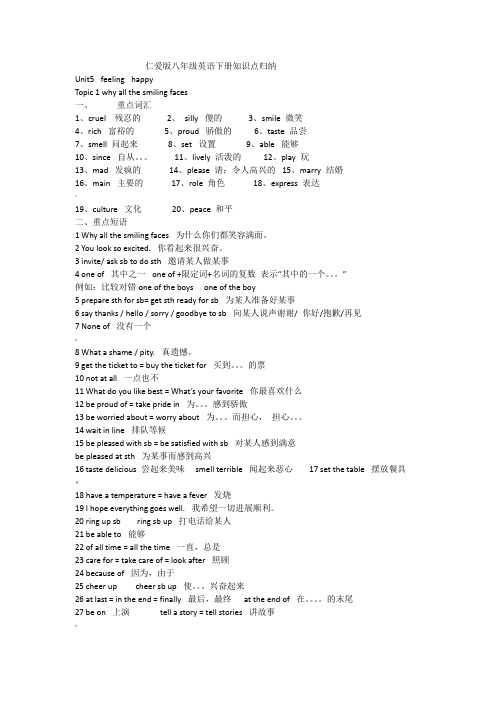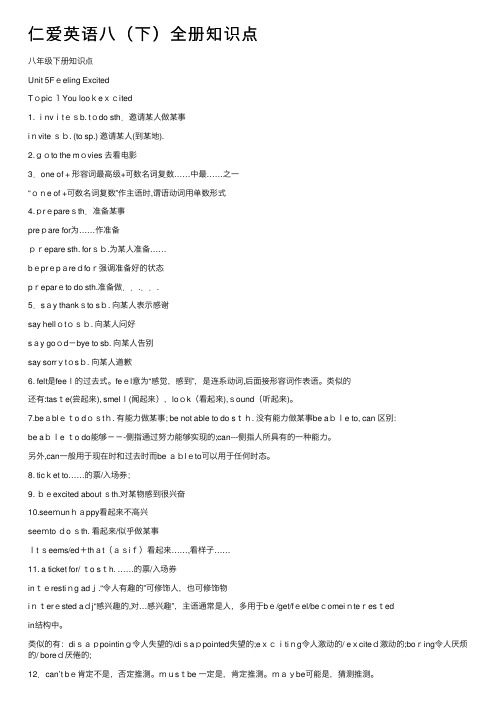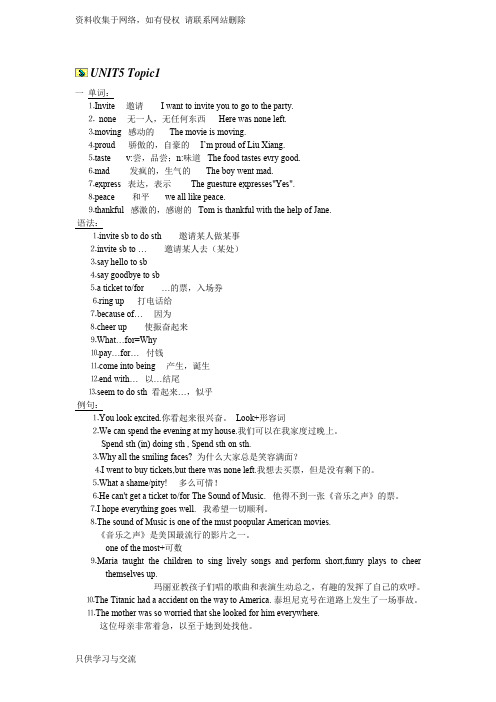仁爱英语八年级下知识点总结
仁爱英语八年级下各单元短语归纳完整版

仁爱英语八年级下各单元短语归纳集团标准化办公室:[VV986T-J682P28-JP266L8-68PNN]Unit5TopicOne1.lookexcited看起来兴奋,激动2.feelhappy/disappointed感到高兴/失望3.tastedelicious/good尝起来美味4.soundwonderful/sweet/great听起来精彩/甜美/好,不错5.smellterrible闻起来恶心6.gomad/bad发疯/变坏7.turngreen/yellow变成绿色/黄色8.bepopularwithsb.受某人欢迎9.seem(tobe)unhappy似乎不高兴10.seemtodosth.似乎做,好像做11.gotothemovies=gotoseethemovie去看电影12.invite/asksbtodosth邀请某人做某事13.invitesb.to+sp.邀请某人去/参加…14.oneof+最高级+pl.最…之一15.preparesthforsb=preparesb.sth.为某人准备好某事16.preparetodosth.准备做17.saythanks/hello/sorry/goodbyetosb向某人说声谢谢/你好/抱歉/再见18.Whatashame/pity.真遗憾。
19.get/buytheticketto/for买到…的票20.beabletodo=can/coulddo能够做…21.willbeabletodo将会做…22.onthe/one’sway to在去往…的路上23.onthewayhome/here/there在回家/去这儿/那儿的路上24.rightnow/away=atonce立即,马上25.feel/besorryfor(doing)sth为(做)某事感到抱歉/遗憾/难过26.beangrywithsb.对某人生气27.justnow=amomentago刚才(用于过去时)28.carefor=takecareof=lookafter照顾29.becauseof+n.因为…,由于…30.because+句子因为…,由于…31.cheersbup=makesb.Happy使…兴奋起来32.atlast=intheend=finally最后,最终33.attheendof…在…的末尾/尽头34.atfirst起初,开始smilingfaces笑脸35.noisychildren吵闹的孩子们36.lovelysongs活泼的歌曲37.livealone独居be/feellonely感到孤独38.teachsb.todosth.教某人做39.teachoneselfsth.=learnsth.byoneself自学…eintobeing=beborn出现,形成41.fallinto落入,掉入lookfor寻找42.everywhere=hereandthere到处43.bewithahistoryof200years=haveahistoryof200years=have200 yearsofhistory有着两百年的历史eintobeing=beborn形成efrom=befrom来自46.moreandmore+n./原级越来越来…47.be/becomeinterestedin(doing)sth.对…感兴趣48.makepeacewithsb与某人和解49.findawaytodo/ofdoingsth.找到做…的方法50.Itseems/seemedthat+句子。
仁爱版八年级英语下册知识点归纳

仁爱版八年级英语下册知识点归纳Unit5 feeling happyTopic 1 why all the smiling faces一、重点词汇1、cruel 残忍的2、silly 傻的3、smile 微笑4、rich 富裕的5、proud 骄傲的6、taste 品尝7、smell 问起来8、set 设置9、able 能够10、since 自从。
11、lively 活泼的12、play 玩13、mad 发疯的14、please 请;令人高兴的15、marry 结婚16、main 主要的17、role 角色18、express 表达~19、culture 文化20、peace 和平二、重点短语1 Why all the smiling faces 为什么你们都笑容满面。
2 You look so excited. 你看起来很兴奋。
3 invite/ ask sb to do sth 邀请某人做某事4 one of 其中之一one of +限定词+名词的复数表示“其中的一个。
”例如:比较对错one of the boys one of the boy5 prepare sth for sb= get sth ready for sb 为某人准备好某事6 say thanks / hello / sorry / goodbye to sb 向某人说声谢谢/ 你好/抱歉/再见7 None of 没有一个<8 What a shame / pity. 真遗憾。
9 get the ticket to = buy the ticket for 买到。
的票10 not at all 一点也不11 What do you like best = What’s your favorite你最喜欢什么12 be proud of = take pride in 为。
感到骄傲13 be worried about = worry about 为。
八年级下册仁爱英语知识点

八年级下册仁爱英语知识点八年级下册仁爱英语知识点大全go out for dinner 出去吃饭stay out late 在外面待到很晚go to the movies 去看电影get a ride 搭车work on 从事finish doing sth. 完成做某事clean and tid y 干净整洁do the dishes 洗餐具take out the rubbish 倒垃圾fold your/the clothes 叠衣服sweep the floor 扫地make your/the bed 整理床铺clean the livng room 打扫客厅no problem 没问题welcome sb. 欢迎某人come home fro m school/ work放学/下班回家throw down 扔下sit down 坐下come over 过来take sb. for a walk 带某人去散步all the time 一直;总是all day/evening 整曰/夜do housew ork 做家务shout back 大声回应walk away 走开.share the housework 分担家务a com fortable home 一个舒适的家in surprise 惊讶地get som ething to drin k 拿点喝的东西watch one show 观看一个节目hang out 闲逛pass sb. sth. 把某物传给某人lend sb. sth. 把某物借给某人get sth. wet 使某物弄湿hate to do sth. 讨厌做某事do chores 做杂务help sb. (to ) d o /with sth帮助某人干某事bring a tent带顶帐篷来buy some snacks买些小吃go to the store去商店invite sb. to a party邀请某人参加聚会make sb. do sth. 使某人做某事enough stress足够的压力awaste of tim e浪费时间in order to为了get good grades取得好成绩m ind doing sth. 介意做某事depend on依赖;依靠develop c h ild re n ’ s independence发展孩子的独立性look after/take care of 照顾;照看do one’ s part in (doin g ) sth.做某人分内的事八年级英语Unit3单元知识点:重点句型1. Could you please…..do sth. ?Could you please clean your room?你能整理一下你的房间吗?2. I have to do some work.我必须干些活。
八下英语仁爱版知识点总结

八下英语仁爱版知识点总结Unit 1: Getting to Know Each Other.Greetings and Introductions: Hello, goodbye, nice to meet you, my name is..., what's your name?, where are you from?, I'm from..., how are you?, I'm fine, thank you.Personal Information: name, age, birthday, address, phone number, email address, nationality, favorite color, favorite food, favorite subject, hobbies.Making Friends: asking questions to get to know someone, finding common interests, being friendly and approachable.Unit 2: My Family and Friends.Family Members: father, mother, brother, sister, grandparents, aunts, uncles, cousins.Describing Family Members: age, appearance, personality,occupation, hobbies.Friends: best friends, close friends, classmates, neighbors, online friends.Describing Friends: appearance, personality, interests, how you met them.Unit 3: My School Life.School Subjects: English, math, science, history, geography, music, art, physical education.School Activities: attending classes, taking notes, doing homework, studying for tests, participating in extracurricular activities.School Rules and Regulations: uniforms, attendance, behavior, discipline.School Events: school trips, sports events, cultural performances, graduation ceremonies.Unit 4: Where I Live.Types of Houses: houses, apartments, villas, bungalows, mansions.Parts of a House: living room, kitchen, bedroom, bathroom, garden.Describing a House: size, location, number of rooms, amenities, appearance.Neighborhood: neighbors, local businesses, parks, schools, hospitals.Unit 5: Daily Life.Daily Routine: waking up, getting dressed, eating breakfast, going to school, doing homework, playing, watching TV, going to bed.Food and Drinks: breakfast, lunch, dinner, snacks,fruits, vegetables, meat, fish, drinks.Clothing: types of clothes, colors, patterns, sizes, styles.Unit 6: My Town or City.Landmarks: famous buildings, monuments, statues, bridges.Public Places: parks, squares, museums, libraries, shopping malls, hospitals.Transportation: buses, trains, cars, taxis, bicycles.People and Culture: local customs, traditions, festivals, food.Unit 7: Travel and Adventure.Travel Destinations: countries, cities, tourist attractions.Travel Activities: sightseeing, shopping, dining, hiking, swimming.Transportation: planes, trains, buses, cars.Travel Tips: packing, getting around, staying safe.Unit 8: The Natural World.Animals: mammals, birds, fish, reptiles, amphibians.Plants: flowers, trees, shrubs, fruits, vegetables.Natural Resources: water, forests, minerals, oil, gas.Environmental Issues: pollution, climate change, deforestation.Unit 9: Science and Technology.Inventions: telephone, computer, microscope, television,airplane.Scientists: Albert Einstein, Marie Curie, Isaac Newton, Charles Darwin.Scientific Experiments: conducting experiments, collecting data, analyzing results.Technological Advancements: smart phones, laptops, tablets, artificial intelligence.Unit 10: The World Around Us.Countries of the World: continents, countries, capitals.Cultures of the World: languages, religions, traditions, customs.Global Issues: poverty, hunger, war, climate change.International Cooperation: United Nations, Red Cross, Doctors Without Borders.。
仁爱英语八(下)全册知识点

仁爱英语⼋(下)全册知识点⼋年级下册知识点Unit 5Feeling ExcitedTopic 1You lookexcited1. invitesb. todo sth.邀请某⼈做某事invite sb. (to sp.) 邀请某⼈(到某地).2.goto the movies 去看电影3.one of + 形容词最⾼级+可数名词复数……中最……之⼀“one of +可数名词复数”作主语时,谓语动词⽤单数形式4.preparesth.准备某事prepare for为……作准备prepare sth. forsb.为某⼈准备……bepreparedfor强调准备好的状态prepareto do sth.准备做......5.say thanksto sb. 向某⼈表⽰感谢say hellotosb. 向某⼈问好say good-bye to sb. 向某⼈告别say sorrytosb. 向某⼈道歉6. felt是feel的过去式。
feel意为“感觉,感到”,是连系动词,后⾯接形容词作表语。
类似的还有:taste(尝起来), smell(闻起来),look(看起来),sound(听起来)。
7.beableto dosth. 有能⼒做某事; be not able to do sth. 没有能⼒做某事be able to, can 区别:be able to do能够---侧指通过努⼒能够实现的;can---侧指⼈所具有的⼀种能⼒。
另外,can⼀般⽤于现在时和过去时⽽be ableto可以⽤于任何时态。
8. ticket to……的票/⼊场券;9. beexcited about sth.对某物感到很兴奋10.seemunhappy看起来不⾼兴seemto do sth. 看起来/似乎做某事It seems/ed+that(asif)看起来……,看样⼦……11. a ticket for/ to sth. ……的票/⼊场券interesting adj.“令⼈有趣的”可修饰⼈,也可修饰物interested adj“感兴趣的,对…感兴趣”,主语通常是⼈,多⽤于be/get/feel/becomeinterestedin结构中。
八年级下册仁爱版英语知识点总结

八年级下册仁爱版英语知识点总结对知识的渴求是人类的自然意向,任何头脑健全的人都会为获取知识而不惜一切,下面小编给大家分享一些八年级下册仁爱版英语知识,希望能够帮助大家,欢迎阅读!八年级下册仁爱版英语知识1【重点短语】1.be busy doing sth 忙于做某事be busy with sth. 忙于某事2.on vacation度假3.work out 算出,制定,完成4.in the center of 在……中央5.can’t wait to do sth 迫不及待做某事can’t help doing sth 情不自禁做某事6.one and a half hours= one hour and a half一个半小时7.be surprised at sth. 对某事感到惊奇be surprised to do sth. 惊奇于做某事8.in all directions四面八方9.a parking lot 一个停车场10. push one’s way out从人群中挤出来11.at last =in the end =finally最后,终于12.be famous for 因为……而著名be famous as 作为……而著名13.have fun (in) doing sth. 从做某事中获得乐趣14.thank goodness 谢天谢地15.as soon as 一……就……16.be full of…满的,充满的17.make a plan 制定一个计划18.lie in 位于……内(指某一范围之内)lie on 与……紧挨着(接壤,不管辖)lie to 隔……相望(不接壤,不管辖)19.be/get lost 迷路20.take out 拿出21.step on 踩,踏22.ten meters long/wide/high十米长/宽/高【词形转换】1.north n.北,北方northern adj.北方的,北部的2.mean v.意味着meaning n.意义,含义meaningful adj.重要的,重大的,意味深长的3.crowd n.[C]人群v.拥挤crowded adj.拥挤的4.experience v.经历n.经历[C];经验[U]experienced adj.有经验的【重点句型】1.Would you like to come to China for your vacation?你愿意来中国度假吗?2.I can’t wait to see it.我迫不及待想看它了。
仁爱八年级下英语知识点

仁爱八年级下英语知识点英语作为国际通用语言,对于现代人的职业发展和日常交流都极其重要。
在仁爱八年级下,我们将从听说读写四个方面,全面学习英语知识点。
语法知识1. 直述句(陈述句)主语+谓语+宾语例句:She loves ice cream.2. 疑问句(一般疑问句)助动词+主语+谓语+宾语例句:Do you like pizza?3. 祈使句(命令句)动词原形+宾语例句:Clean your room.4. 句子成分(主语、谓语、宾语、定语、状语等)例句:The boy with glasses is my friend.口语表达1. 自我介绍例句:Hello, my name is Jack. I am from Shanghai.2. 意见交流例句:What do you think of this movie?3. 问路例句:Excuse me, where is the nearest bank?4. 约会例句:Would you like to have dinner with me tonight?听力训练1. 美国口音和英国口音的区别2. 不同场景下的英语口语表达3. 对话中正确听取数字、时间等4. 听取简单的新闻或者广播等阅读理解1. 阅读基础知识(字母、数字、大小写)2. 阅读简单的短文,了解文章基本内容3. 阅读故事和小说,理解情节和人物关系4. 阅读新闻等实用文章,了解时事信息写作能力1. 自我介绍2. 写日记、周记、月记等3. 写作文,例如:写一篇关于影响健康的因素的文章4. 写简历,求职信等总结仁爱八年级下英语知识点包含了很多方面,包括语法、口语、听力、阅读和写作等,我们需要在日常学习中逐步积累和运用这些知识点。
只有通过反复的练习和实践,我们才能真正掌握英语知识,使其成为我们通往更广阔世界的一把钥匙。
仁爱版英语八年级下册知识点详解

UNIT5 Topic1一单词:⒈Invite 邀请I want to invite you to go to the party.⒉none 无一人,无任何东西Here was none left.⒊moving 感动的The movie is moving.⒋proud 骄傲的,自豪的I’m proud of Liu Xiang.⒌taste v:尝,品尝;n:味道The food tastes evry good.⒍mad 发疯的,生气的The boy went mad.⒎express 表达,表示The guesture expresses"Yes".⒏peace 和平we all like peace.⒐thankful 感激的,感谢的Tom is thankful with the help of Jane.语法:⒈invite sb to do sth 邀请某人做某事⒉invite sb to …邀请某人去(某处)⒊say hello to sb⒋say goodbye to sb⒌a ticket to/for …的票,入场券⒍ring up 打电话给⒎because of… 因为⒏cheer up 使振奋起来⒐What…for=Why⒑pay…for…付钱⒒come into being 产生,诞生⒓end with…以…结尾⒔seem to do sth 看起来…,似乎例句:⒈You look excited.你看起来很兴奋。
Look+形容词⒉We can spend the evening at my house.我们可以在我家度过晚上。
Spend sth (in) doing sth , Spend sth on sth.⒊Why all the smiling faces? 为什么大家总是笑容满面?⒋I went to buy tickets,but there was none left.我想去买票,但是没有剩下的。
- 1、下载文档前请自行甄别文档内容的完整性,平台不提供额外的编辑、内容补充、找答案等附加服务。
- 2、"仅部分预览"的文档,不可在线预览部分如存在完整性等问题,可反馈申请退款(可完整预览的文档不适用该条件!)。
- 3、如文档侵犯您的权益,请联系客服反馈,我们会尽快为您处理(人工客服工作时间:9:00-18:30)。
仁爱英语八年级下知识点总结Unit 5 Feeling HappyTopic 1 Why all the smiling faces?一. 重点词汇:(一)反义词happy----unhappy/ sad lucky----unlucky poor----rich kind----cruel popular----unpopular smart----stupid/ silly interesting----boring(二)表示情感的形容词excited感到兴奋的surprised 吃惊的happy 快乐的unhappy/ sad 伤心的angry / mad 生气的worried 焦急的afraid/ frightened 害怕的disappointed 失望的proud 自豪的lonely 孤单的nervous 紧张不安的interested 感到有趣的(三)重点词组1. one of my favorite movies 我最喜欢的电影之一2. spend the evening 过夜3. say thanks / goodbye/ hello to sb. 向某人道谢/道别/问好4. tell a short story 讲一个小故事5. a ticket to…一张…的票6. wish to do sth. 希望做某事7. get enough sleep 得到足够的睡眠8. win a medal 获得一枚奖牌9. feel proud/ lonely 感到自豪/孤单10. set a table for…为……摆餐具11. have a temperature = have a fever 发烧12. be able to do sth. 有能力做某事13. ring up 给……打电话14. care for= look after/ take care of 照顾15. because of 由于16. cheer up / cheer on 使……振奋、高兴起来/ 为……喝彩、加油17. play the role of sb. 扮演某人的角色18. be on 上演; 放映19. at first 首先20. fall into 落入21. be afraid of doing sth. 害怕做某事22. in/at the end = at last 最后23. go mad 发疯24. come into being 形成25. be full of 充满…26. be popular with…受……喜爱27. make peace 制造和平28. end/begin with…以……结尾/开始二. 重点句型及重点语言点1. How nice! 真是太好了!What a shame! 真可惜! =That’s too bad!What bad news! 多糟的消息!这三句全都是感叹句.它们的结构为:1) How + adj./ adv. + 主语+ 谓语! 如: How moving the movie is! How fast the boy runs!2) What + a/an + adj. + n. (可数名词的单数) + 主语+ 谓语! 如: What a big apple (it is)!3) What + adj. + n.(可数名词的复数或不可数名词) + 主语+ 谓语! 如:What interesting stories (they are)! What hard work( it is)!2. Because he can’t get a ticket to The Sound of Music. 因为他没有买到《音乐之声》的票. to 表“的”,常见的搭配如下:a ticket toThe Sound of Music 一张《音乐之声》的票the answer to the question 问题的答案the key to the door 门的钥匙the way to…去…..的路3. I think Mr. Lee likes it very much and really wishes to watch it. 我认为李老师非常喜欢它而且的确想去看. wish/ hope to do sth.希望做某事与wish 相关的结构还有: wish/ hope + that引导的从句; 如:I wish/ hope (that) we will win.我们可以说wish sb. to do sth. 而不能说hope sb. to do sth.;4. I’ll ring up Michael later. 稍后我打电话给迈克.ring up sb. = call/ ring/ phone sb. = give sb. a ring/ call/ telephone = make a telephone to sb.当宾语为代词时, 只能放中间.如: ring me/him/her up5.…since they were not able to go. ……既然他们不能去.can与be able to 二者都表“能;会”,在指“一般能力”时,常互换。
如:He can/is able to work out the problem. 他能算出这道难题.区别: can 只有现在式和过去式(could),没有数的变化;而be able to 有时态及数的变化. 如: I/ She couldn’t swim three years ago, but now I / She can .三年前,我/她不会游泳, 但现在我/她能.I will be able to see him next week. 下周, 我将会看到他.They were /He was able to climb the mountain, but now they aren’t/ He wasn’’re / He was too old. 他们/他过去能爬得上这座山, 但现在不能. 他们/他太老了.6. I’m sure Mr. Lee will be surprised and happy! 我确信李老师会很惊奇也很高兴!be surprised “感到惊奇的”, 主语一般为人.be surprising “令人惊奇的”, 主语一般为物.类似的有:interested/ interesting; excited/ exciting; bored/ boring7. The lonely father often became angry because of the noisy children. 孤独的父亲经常由于吵吵闹闹的的孩子们而发怒了。
because of “由于”,是介词短语,后常跟名词或短语。
如:He didn’t come to school becaus e of his illness./ because he was ill.由于他的病,他没来上学。
We didn’t go there because of the heavy rain./ because it rained heavily.由于大雨,我们没去那儿。
8. Maria was able to cheer up the family by teaching them to sing lively songs…玛丽亚有能力通过教他们唱轻快的歌曲使整个家庭振作起来。
by 是介词,指“通过(某种方式)”,后面跟名词、代词、形容词或动名词。
9. What did Maria go to the V on Trapp family for? = Why did Maria go to the V on Trapp?玛丽亚为了什么目的去冯特拉普家庭?10. … and the mother was so worried that she looked for him everywhere, …这位母亲是如此焦急,以致于他四处寻找他。
so + adj/ adv. + that + 句子指“如此…以致于”三. 重点语法1.系表结构:Linking verb. + adj. 常见的连系动词如下:1)be 动词:He is helpful. They are tired.2) 表“…起来”:look看起来; sound听起来; taste尝起来;feel摸起来等等.如:3)表状态变化的连系动词有:get 变得; turn 转变; go变; become变成等等. 如:In summer, the days get longer, the weather gets warmer.In fall, the leaves turn yellow. The mother went mad.He became angry.2.because 引导的原因状语从句: because 用来回答why提问的问句,表示的原因语气很强,一般用在主句后面,强调因果关系.Mr. Wang looks tired because he worked late last night and didn’t get en ough sleep. Kangkang is disappointed because his best friend is not able to come.----Why do they feel proud?----Because a player from their country won a medal.Topic 2 Why is Beth crying?一、重点词汇:(一)词形转换:(反义词)well (最高级)shyest(过去式)understood (同义词)worried(形容词)satisfied (形容词)surprised(动词)suggest (形容词)strange(同义词)suggestion (反义词)too(名词)humor (名词)sadness(反义词)fair (过去式)hit(二)重点词组:( 1 ) “be + 形容词+ 介词”的结构:be worried about 对……感到担心/ 焦虑be anxious about 对……感到焦虑be glad about 对……高兴be nervous about 对……紧张be strict with sb. 对某人严格be strict in / about sth. 对某事严格be patient with 对……耐心be pleased / satisfied with 对……满意be bored with 对……烦闷be popular with 受……欢迎be angry with/at sb. 对某人生气be angry at/ about sth. 对某事生气be surprised at 对……惊奇be mad at 对……气愤be excited at 对……兴奋be interested in 对……有兴趣be tired of 对……疲倦be afraid of 对……害怕( 2 ) 课文词组:1. do badly in 在某方面表现很差2. talk with sb. = have a talk with sb. 与某人谈一谈3. over and over again 反复地; 一再4. wait in line 排队等候5. fall behind 落后6. get sb. to do sth. 让某人做某事7. at one’s age 在某人的年龄时8. try to eat less high-energy food 少吃高能量的食品9. calm down 冷静; 镇静10. have bad experiences 有不好的经历11. give…a hand 帮助12. in one’s teens 在某人十几岁时13. happen to sb. 发生14. move to spl. 搬到某处15. get used to (doing) sth. 习惯于(做)某事16. be / make friends with 与……交朋友17. join in 参加(活动)18. fit in 被他人接受;相处融洽19. deal with 处理; 处置20. fail to pass an exam = fail an exam 考试不及格21. lose a friend or relative 失去一个朋友或亲戚22. refuse to do sth. 拒绝做某事23. argue with sb. 与某人争论24. have a normal life 过正常的生活二、重点句型及重点语言点1. Anything wrong? = Is there anything wrong? 有什么麻烦吗?形容词修饰不定代词要后置. 如:something bad 不好的事情everything new 一切新的事物2. What seems to be the problem? 似乎有什么问题?seem to do sth. “似乎做某事”常与“It seems that + 句子”转换, 如:He seems to know her name. = It seems that he knows her name. 似乎他知道她的名字. seem + adj “似乎(怎样)”, 构成系表结构. 如:You seem sad. = You seem (to be) sad.= It seems that you are sad.你似乎很伤心.3. What is the teacher like? 那个老师是什么样的人?What’s sb. like? 常询问人的内在品质或性恪. 如:--What’s Beth like? -- She is shy and quiet.What does sb. look like? 常询问人的长相. 如:--What’s Beth look like ? -- She is nice with big eyes.be like 与look like 常可以互换, 如:He looks like his mother. = He is like his mother. 他看起来像他的父亲.4. It is important to talk to someone else. 跟其它人交流很重要.句型“It is + adj. + to do”中, “It”是形式主语,真正主语是后面的动词不定式. 如:It is normal to feel tired after a long trip.长途旅行后,感到疲劳是正常的.It is dangerous to swim in the sea. 在大海里游泳是很危险的.5. …, but I don’t know how to get other students to talk with me. 但是我不知道怎样使他们和我交谈.get sb. to do sth. “使(让/ 叫) 某人做某事”, 相当于ask / tell sb. to do sth.或者说let / make sb. do sth.6. It usually takes me a long time to become happy again. 通常要花我很长时间才能重新快乐起来.句型“It takes sb. some time to do sth.”花了某人某时做某事. 如:It took me three days to finish this work. 花了我三天时间完成这项工作.7. It is said that…据说……8. ... when something bad happens to us. 当不好的事情发生在我们身上时.“sth. happens to sb.”, 指“某事发生在某人身上”. 是一种惯用句型. 如:A serious accident happened to his brother yesterday.昨天,一个重大事故发生在他的兄弟身上.happen to do sth. 指“碰巧做某事”, 如:I happened to see my friend Jim in the street yesterday.昨天,我碰巧在街上看到我的朋友吉姆.9. How time flies! “光阴似箭!”是How quickly the time flies! 简略句.10. I have to get used to everything new. 我不得不去适应一切新的事物.get / be used to (doing) sth. “习惯于(做)某事”. 其中是介词. 如:He can’t get used to the weather here. 他不习惯这儿的天气.I am used to getting up early. 我习惯于早起.used to do sth. 指“过去常做某事”, 如:He used to listen to the pop songs, but now he listens to the folk songs.他过去常听通俗歌曲,但现在他听民歌.11. I try to join in activities of many kinds. 我尽量参加各式各样的活动.join in sth. 指“参加……活动”, 相当于take part in或be in.join 指“参加某个组织或团体”12 . How does Jeff deal with his sadness? 杰夫怎样处理他的忧伤的?How…deal with? “怎样处理?”相当于“What ….do with?”三、重点语法同级比较1) 表示两者在某一方面程度相等时,用句型“as + 形容词/副词原级+ as + 比较对象”. 表“与……一样”. 如:Celia is as patient as Sue. 西莉亚与苏一样耐心.Jim draws as well as Tom. 吉姆画得与汤姆一样好.2) 表示某人或某物在某一方面,不如另一个人或另一物时,用句型“not + as/so + 形容词/副词原级+ as + 比较对象”, 表“不如……”. 如:Jim isn’t as tall as Tom.= Tom is taller than Jim. 吉姆不如汤姆高./ 汤姆比吉姆高.Jim doesn’t studies as hard as Tom. = Tom studies harder than Jim. 吉姆不如汤姆学得努力./ 汤姆学得比吉姆努力.The roads here are not as clean as those in our hometown. 这儿的路不如我们家乡的路干净.Topic 3 Michael is feeling better.一、重点词汇:( 一) 词形转换:(同义词)nervous (副词)truly (动词)express4. husband(对应词)wife5. choice(动词)choose6. relax(形容词)relaxed(动词)think 8. decision(动词)decide (名词)safety( 二) 重点词组:1. have a bad cold 患重感冒2. get injections 打针;注射3. follow the doctor’s advice 遵从医嘱4. stay at home alone 独自呆在家里5. come over to 过来;顺便来访6. at the end of the month 在月底7. take it easy 别急;慢慢来8. take turns to do sth. 轮流做某事9. be happy for sb. 为某人高兴10. in a good/bad mood 处于好/坏的情绪11. stay/keep angry 保持生气(的状态)12. smile at life 笑对生活13. plan a surprise 计划一个惊喜14. make masks with different expressions 制作具有不同表情的面具15. put on a short play 表演短剧16. prepare for 为……作准备17. get along with 与……相处18. look up into the sky 抬头望向天空19. at midnight 在半夜20. on the way home 在回家的路上21. give a speech 演讲22. try out 尝试;试验23. in high spirits 兴高采烈24. think over 仔细思考25. bring back a sense of safety 找回安全感二、重点句型及重点语言点1. I’m feeling even worse. 我甚至觉得更糟了.much, a little 与even常用来修饰比较级. 如:He is much older than me.他比我大得多。
